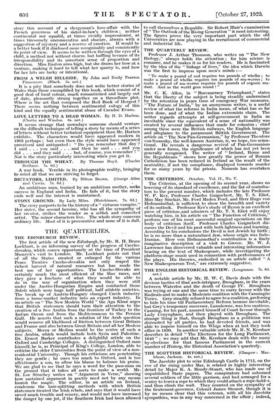THE QUARTERLIES.
THE EDINBURGH REVIEW.
The first article of the new Edinburgh, by Mr. R. H. Bruce Lockhart, is an informing survey of the progress of Czecho- slovakia, which comes opportunely at the time of President Masaryk's visit to London. Mr. Lockhart points out that of all the States created or enlarged by the various Peace Treaties Czecho-slovakia not only reaped the richest harvest of natural resources but has made the best use of her opportunities. The Czecho-Slovaks are certainly much the most efficient of the Slav races, and they gave a foretaste of what they would be able to do in the way of organization when they were still under the Austro-Hungarian Empire and conducted those Sokols which were huge half political, half athletic societies. The break up of Au-stria-Hungary changed Czech industry from a home-market industry into an export industry. In an article on " The New Moslem World " the Aga Khan urges that British statesmen should turn their attention to the creation of a free Arabia from the frontiers of Turkey to the Indian Ocean and from the. Mediterranean to the Persian Gulf. He asserts that such a solution of the Arab question would remove all likelihood of friction between Great Britain and France and also between Great Britain and all her Moslem subjects. Mecca or Medina would be the centre of such a free Arabia, which would include both Syria and Palestine. Dr. Ernest Barker contributes a delightful article on the Oxford and Cambridge Colleges. A distinguished Oxford man himself, he is, as Principal of King's College, London, able to criticize the older Universities from the point of view of a non- residential University. Though his criticisms are penetrating they are gentle ; he owes too much to Oxford, and is too affectionate a son, to allow his blame to balance his praise. We are glad to see that he says a word for the pass-man on the ground that it takes all sorts to make a world. Mr. St.' Loe Strachey writes on " Aigument in Verse," showing how sustained argument in poetry need not by any means banish the magic. The editor, in an article on Ireland, condemns the hair-splitting methods with which British statesmen treated the Irish rebels, and says that it would have saved much trouble and misery, and would not have increased the danger by one jot, if the Southern Irish had been allowed to call themselves a Republic. Sir Robert Blair's examination of " The Outlook of the Rising Generation " is most interesting. The figures prove, the very important part which the old Universities are now playing in the recruitment of commercial and industrial life.














































 Previous page
Previous page